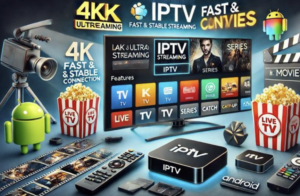Is your TV service outdated while IPTV brings new changes? The fight between iptv vs cable tv is more important than ever as 2025 comes. With over 80% of homes ditching traditional TV, what’s the best tv service in 2025 for you?
Traditional cable TV used to be the top choice for entertainment. Now, streaming vs traditional tv is about finding the right mix of cost, quality, and ease. IPTV streams movies, sports, and shows online without the need for big equipment. Cable, on the other hand, offers steady signals but can be pricey and restrictive.
This article will give you the facts. We’ll look at costs, device support, and video quality to help you choose. With IPTVTrial.com offering flexible plans and worldwide content, the future of TV is here. But does it meet your needs better than cable?
Key Takeaways
- Cost: IPTV subscriptions are often cheaper than cable with no setup fees.
- Flex: IPTV works on phones, tablets, and smart TVs. Cable usually limits to one device.
- Quality: IPTV offers HD/4K if your internet is fast enough. Cable’s signal is steady but can drop in bad weather.
- Content: IPTV has a wide range of global channels. Cable focuses more on local networks.
- Reliability: Cable’s infrastructure ensures a steady signal. IPTV might buffer if your internet is slow.
Make your choice based on your budget, internet speed, and what you like to watch. This guide helps you see which service is best for your lifestyle.
IPTV vs Cable TV: Which is Better in 2025

As TV services change, knowing the difference between IPTV and cable is key. IPTV uses the internet to deliver shows and live TV. It works on many devices, like smartphones and smart TVs. Sites like IPTVTrial.com offer flexible plans that fit what viewers want.
Understanding IPTV Technology and Its Evolution
IPTV turns content into digital streams sent over the internet. It supports HD and 4K quality. Unlike cable, IPTV grows with the internet, thanks to broadband.
Platforms like IPTVTrial.com use smart streaming. This means shows play smoothly, even when the internet is slow.
Traditional Cable TV: Features and Limitations
Cable uses cables to send signals, giving stable picture quality. But, it’s not as flexible as IPTV. Cable’s fixed prices and limited choices seem old-fashioned compared to IPTV’s custom plans.
Key Differences in Content Delivery and Accessibility
IPTV lets you watch TV on many devices, like laptops and tablets. Cable only works on set-top boxes. IPTV also offers more channels worldwide, without limits.
For example, IPTVTrial.com has over 30,000 channels available globally. This beats cable’s regional restrictions.
Future-Proofing Your Entertainment: TV Technology Trends
The future of TV looks bright, with AI and smart home tech. IPTV is ready for these changes, thanks to its cloud-based setup. Cable’s old setup can’t keep up.
As internet speeds get faster, IPTV’s video quality will beat cable’s. This makes IPTV a better choice for the future.
Cost Analysis and Value Proposition: Streaming vs Traditional TV
Cable TV costs a lot. Basic service is $144 a month, and premium tiers go up to $217. You also get extra fees like equipment rentals and installation. This can add hundreds to your bill upfront.
On the other hand, internet tv advantages are clear with IPTV services like IPTVTrial.com. They start at $16.90 a month with no extra costs for hardware. You get live TV and on-demand content without long-term contracts.
Cord cutting options like IPTV save money. For example, IPTVTrial.com is $16.90 a month, which is over 80% less than cable. IPTVTrial.com offers 30,000+ channels starting at $16.90 .
Switching to IPTV can save up to $1,200 a year. You don’t lose out on quality either.
The IPTV market grew to $68.84 billion in 2023. This is because people want affordable, ad-supported plans. IPTVTrial.com even includes ESPN+, beating cable’s sports packages without contracts.
For families, IPTV is very flexible. Pairing IPTV with internet, this is less than cable’s average of $144. Over three years, you can save $1,800+ without giving up 4K streaming or live sports.
Try IPTVTrial.com free trial to see how cord cutting can change your entertainment budget. You won’t lose out on variety or quality.
Conclusion: Making the Right Choice for Your Entertainment Needs
Your choice between cable tv comparison options depends on what you value most. IPTV offers flexible streaming, customizable packages, and saves money by avoiding extra channels. Cable TV is great for those who like physical connections and bundled services like sports.
For the best tv service in 2025, IPTV is perfect for tech lovers who want global content and on-demand shows. Traditional cable is best in rural areas with poor internet or for those who prefer a simple setup.
Think about your budget, how you use devices, and the variety of content you want. Families needing sports or local channels might choose cable. But, travelers or remote workers will find IPTV’s portability useful. Check out iptvtrial.com/contact for IPTV plans starting at $16.9/month. They offer 24/7 support and HD streaming for areas with fast internet.
As we look to the future, we might see more hybrid models. But for now, your choice depends on your needs. IPTV is great for those who want more flexibility and global content. Cable is better for those who value simplicity and guaranteed access to certain channels.


